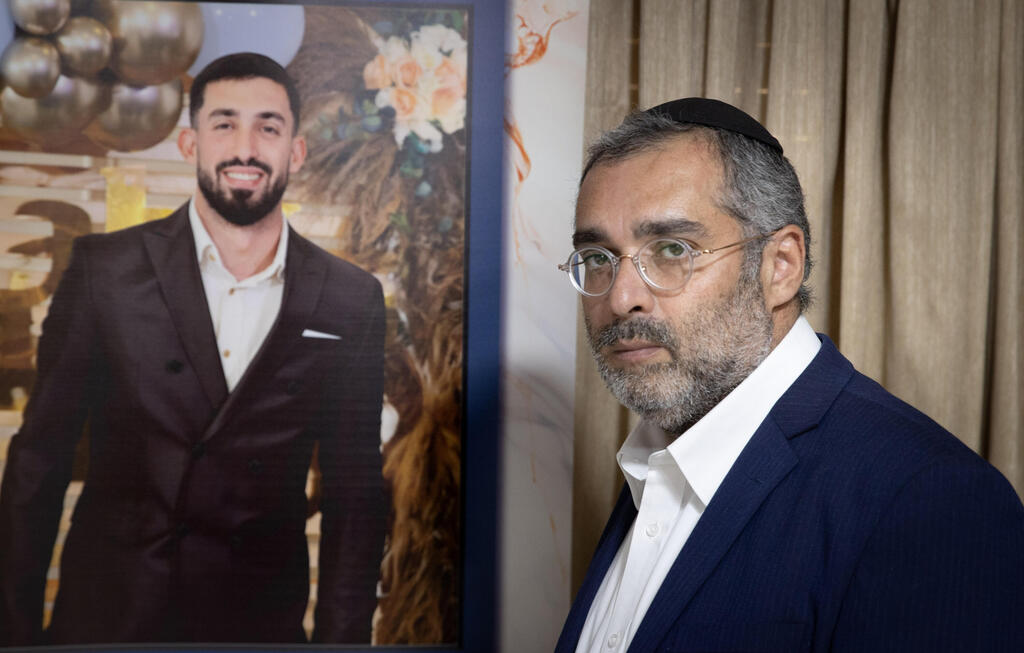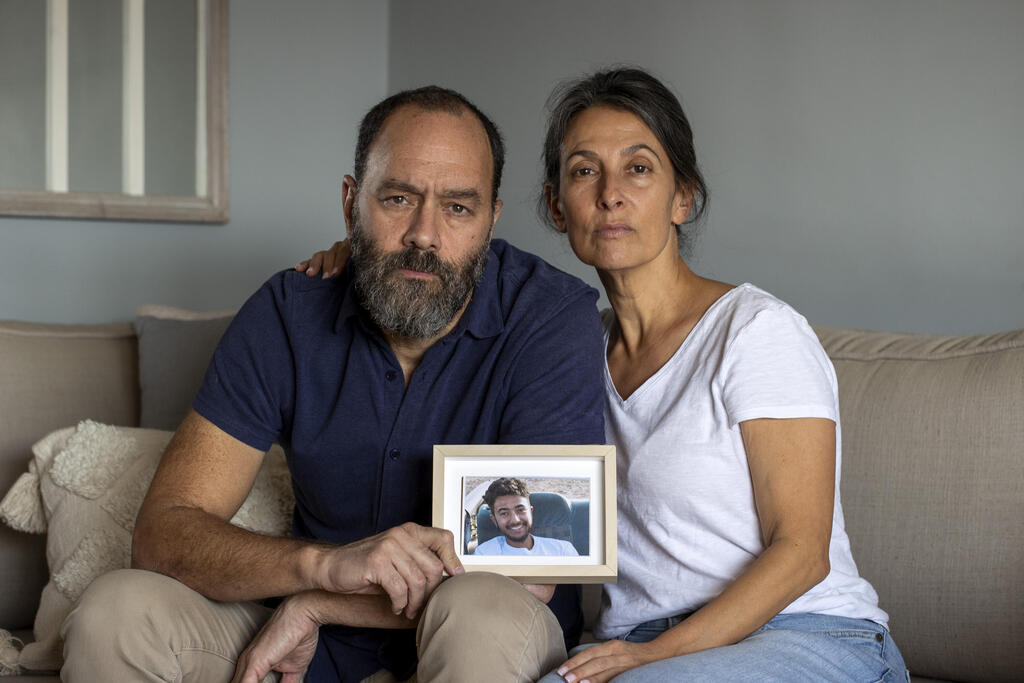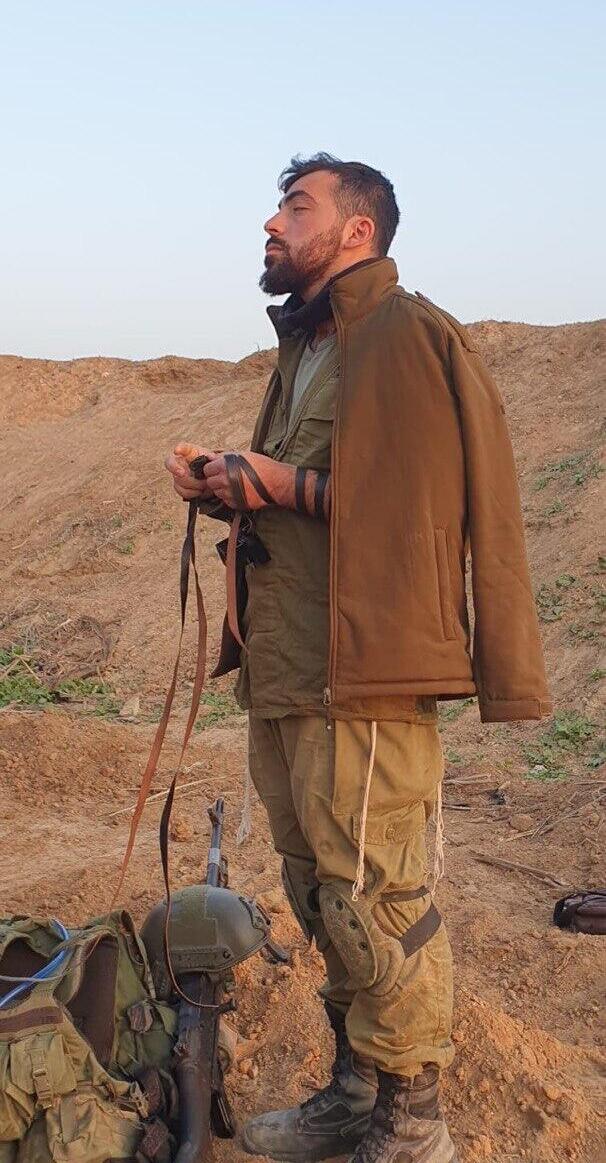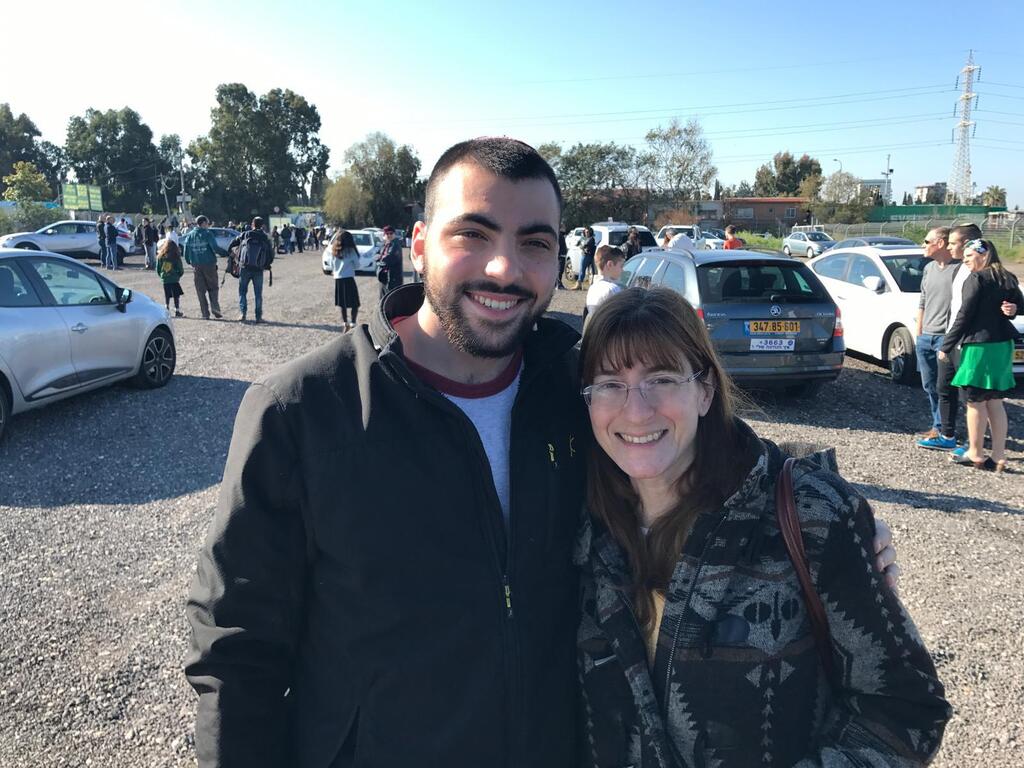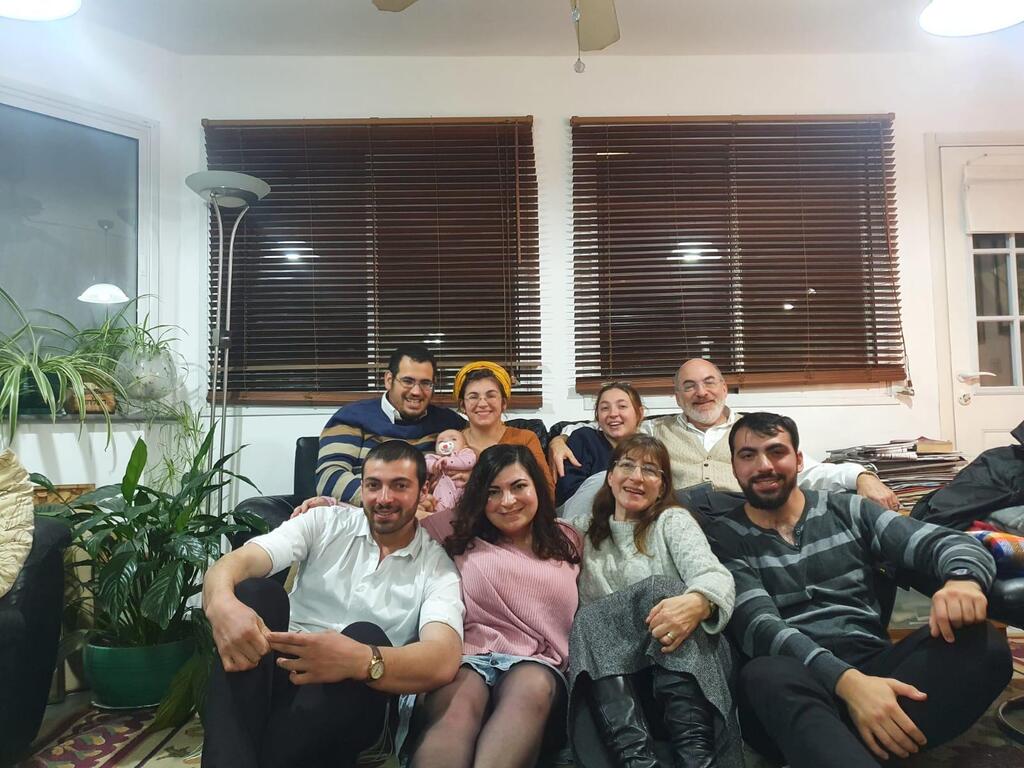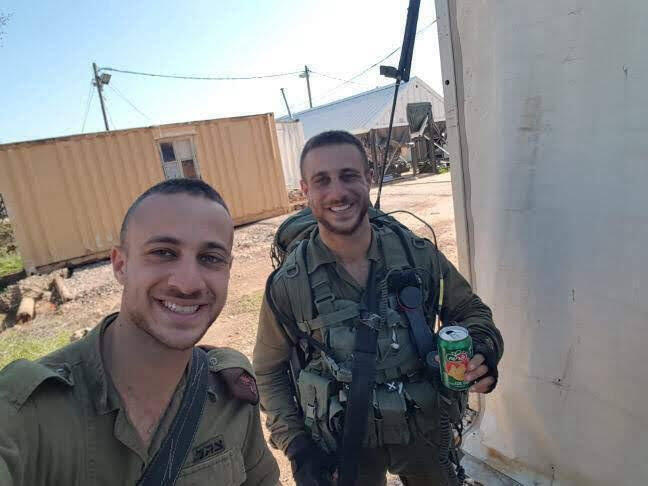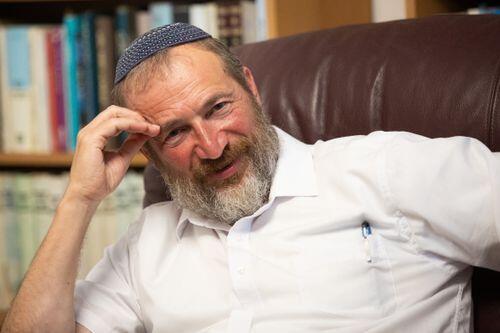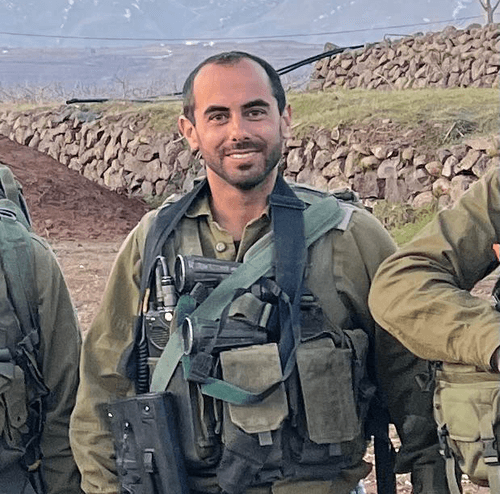Getting your Trinity Audio player ready...
Rabbi Elhanan Danino:
Lecha Eli Teshukati/ My longing, My God, is for You
The father of the late Ori Danino, who was kidnapped from the Nova music festival and murdered in captivity by Hamas talks about the piyut (liturgical poem) "Lech Eli Teshukati" (My longing, My God, is for You), which is attributed to the 12th century Rabbi Avraham Ibn Ezra.
Ori loved "Lech Eli Teshukati" performed by cantor Rabbi Yosef Elhadad. Every Yom Kippur evening when he was unable to come and pray at home, and did not know if he would have a minyan or not, he asked me to sing him the piyut to get into the atmosphere of the day. After I sang it at Ori's funeral, people told me that this year when they hear it during the prayer service, it will have a completely different meaning.
For the Sephardim, the piyut opens the prayers of the holy and awesome day, when we all pass as sons of Meron before the Creator, and therefore we sing on it that we hand over every part of our body. The lines that are especially related to us are: "My bones and blood are yours / my skin with my flesh / My eyes and thoughts are Yours / My shape and my form / to you my spirit / My spirit and strength are Yours / My trust and my hope is You / My heart, blood, and fat are Yours." The words "Like the sheep I sacrifice my offering" make me think of Ori's sacrifice.
At the end of the poem they sing: "Bring me to your garden (of Eden)/ and there will be my seat / and I will rest in your light / and my rest will be honored / and let the light be hidden before you / and under your wings / will my shadow be." This is said about those who die and go to heaven. There are great Torah scholars who have said to me: "The one consolation you can have is that your son is in a place that we will certainly never be able to reach." In Ori's attempt to save his friends, there was devotion and sanctification of God. It is said that those who were killed for sanctifying G-d - no creature can stand in their midst.
It's a spiritual comfort, and I'm a very religious person - and there are still physical moments when I feel like I'm going to explode. In the end it's my eldest son, the leader of his brothers, and suddenly a need has to be filled. I trusted him with my eyes closed, and now I have to work hard, pick up the pieces as well as lead them. It's a fracture upon a fracture. A big gap remains.
My personal prayer focuses on the hope that the people of Israel will understand that we have been in one long Yom Kippur since Simchat Torah. I think the Yom Kippur war has returned to us. This disaster was terrible, and it is a national disaster. This time we were attacked in our home. I don't think there is a single Jew who doesn't take stock of Yom Kippur, and I think everyone should look at themselves and try to understand what they are contributing this year to the unity of the people of Israel, in order to join the forces of love and unity of the people. Therein lies the secret of our existence. The people are connected, the people love. I walk down the street and I see it. The background noises you hear are marginal, and it's a shame that even in the media it seems as if they set the tone and the leaders feed off of it because unfortunately politics is built on that.
Elhanan Danino tearfully sings 'Lecha Eli Teshukati' at his son Uri's funeral on Mount Herzl
Rachel Goldberg-Polin:
Ki Anu Amecha/ Because We Are Your People
This piyut (liturgical poem) is pretty simple in its literal explanation. How we relate to Hashem (God) is complicated to digest, so the writer describes different metaphors which can be helpful to plug into, to explain how we experience our relationship with God.
But the part that I like about this piyut is not having to decide which of the dynamics best describes how I feel about my connection to God. That is not the part that I feel makes the most impactful impression on me. What strikes me when we say this piyut is one small word, "Anu" -"We."
I always look around the room of my synagogue and think 'Anu'- 'We." There are always people with whom I hope God considers me part of them, since they are so worthy, kind and pious, and I'd like to be thought of as part of them. And there are also people with whom I feel I have nothing in common, or even with whom I know our opinions, philosophies and outlooks differ. And yet... here I am, lumped together with them. We are 'Anu.'
We are 'We.' It's not 'me' and 'them'. We are one.
That is part of what we are always challenged with in life; being an us; even when 'us' is not a monolithic carbon copy of 'me'.
The test is, how do we make ourselves 'Anu'-'We' even when it is hard?
How to find the sameness, even when there is so much difference?
How to find solace in each other, even when there is so much suffering, pain and tears?
May we be blessed by Hashem sending us the comfort of becoming 'Anu' - 'We."
Marcy Oster:
Unetaneh Tokef/ Who shall live and who shall die
The mother of Amichai Yisrael Yehoshua Oster, who fell in Gaza on January 1, 2024, after returning in the middle of his post-army travels, and an employee of Ynetnews.
I have been dreading Yom Kippur. As it comes closer, I have become sadder and sadder – and, frankly, incredibly angry at the Master of the Universe. My son, Amichai Yisrael Yehoshua Oster fell in Gaza at the start of the secular new year, on January 1, 2024. He was 24.
It has been 10 months. Time is supposed to soften the blow. It has not. In part that is because the war is still not over and what my son was fighting for – to live in our land safe and secure – has not yet been realized. And because he is not the only amazing young man to have died in the last year fighting our pernicious enemies.
To be honest, each Shabbat and each holiday have presented challenges in the run-up to Yom Kippur. I have conspicuously avoided being inside the synagogue for Hallel, the prayer of praise and thanksgiving to God recited on certain holidays and festivals, and on the first day of each new month. I am so conflicted over Hallel. I have so much to thank God for in my life: for my beautiful family, my amazing community, this beautiful land – things for which I am truly, truly grateful. But right now the words get stuck in my throat. I can neither thank nor praise God now – because the death of my son, and the deaths of the sons and daughters of hundreds of other parents, reverberates in my heart and my mind.
I have made it through yizkor, the memorial prayer, twice. I have been reciting yizkor for the last 15 years, since the death of my father. But it has felt completely different since I added my son to the mix.
I attended services on Rosh Hashana, and listened to my husband serve as the shaliach tzibbur for the Musaf service and I heard his voice catch during the Unetaneh Tokef as he acknowledged that God decides on that very day “who will live out his allotted time and who will leave this world before his time.”
Did Amichai live out his allotted time? I don’t think so. Which is why sitting in synagogue and praying to God on Yom Kippur is going to be so hard.
I have a hard time understanding how last Yom Kippur while this amazing young man was deep in prayer to God, literally praying for his life, that God decided not to inscribe him in the Book of Life, to decide that he would “leave this world before his time”
Amichai was always very careful about making time for prayer, for what I understand are conversations, albeit one-sided, with God. If he was in a hurry, the conversations were quick; and sometimes they were undertaken slowly and with concentration. During his post-army travels in the East and in the United States, he did not miss a day of putting on his tefillin, or phylacteries, strapping in for a conversation with God. On the morning that he fell, he took the time in the morning before entering Gaza to pray – which miraculously was documented in a photo snapped on a cellphone by one of his fellow soldiers. In the photo, he is seen wrapped in his tefillin with his military equipment at his feet; his eyes are closed and his face tilted skyward, in what truly looks like dialogue with God. What was he praying for or thinking? We can only guess. But I am profoundly grateful for this photo – because no matter how violent his end was, he looked at peace with himself and with God at that moment.
I want so much to have such a moment. But I am pretty sure it will not be coming on this Yom Kippur.
Because I have a hard time understanding how last Yom Kippur while this amazing young man was deep in prayer to God, literally praying for his life, that God decided not to inscribe him in the Book of Life, to decide that he would “leave this world before his time.”
So I will continue my internal dialogue with God, which consists mostly of angry words and thoughts. I hope for understanding but will be happy with acceptance. And I will pray for an end to the war, the return of the hostages, the recovery of the injured, emotional healing for the bereaved and real peace.
Rabbi Shmuel Slotki:
Ohila la-El/ I yearn for God
The father of the late Noam and Yishai Slotki, reservists who fell in battle on October 7, 2023. Rabbi Slotki, a lieutenant colonel in the reserves, was involved in locating the missing and murdered in the south after the massacre, as the Company Commander of the Casualty Search & Retrieval Unit of the Israel Defense Forces.
"I yearn for God, I shall entreat His favor, I shall ask Him to grant my tongue eloquence. In the midst of the congregated nation I shall sing of His strength; I shall burst out in joyous melodies for His works. The thoughts in man’s heart are his to arrange, but the tongue’s eloquence comes from the Lord. O Lord, open my lips, so that my mouth may declare Your praise... May the words of my mouth be willing, and the understanding of my heart before thee, O Lord, my creator and my redeemer."
This is an ancient poem whose author is unknown and is recited by the leader of the service in the repetition of the amidah before the verses of Kingship, Remembrance and Shofarot on Rosh Hashanah, and before the order of the kohanim in the Additional Prayer Service, or Musaf, on Yom Kippur.
The verse in the center of the poem, "The thoughts in man’s heart are his to arrange, but the tongue’s eloquence comes from the Lord" (from Proverbs), brings to a very picturesque expression the gap that often exists between the thoughts, ideas and images and what comes out of one's mouth. In this verse we ask the Holy One, blessed be He, to give us the wisdom and abilities to carry out our thoughts in orderly, appropriately and with precise speech as we stand before him in prayer.
This past year, in which we faced and are still facing a war against cruel and bitter enemies from the outside, led us to understand that the differences within us are not differences between enemies, but between people who love each other. The great difficulty of the previous year, which brought us to the brink of a fratricidal war, taught us that disputes are allowed to be, perhaps even deserve to be, and that they serve to sharpen and refine the overall better result; But the poisonous, inciting, hurtful, painful, generalized, personal talk is the great danger. Not the controversy itself.
With proper and respectful speech, coming from a place of sincere, deep and listening discourse, it is also possible to reach understandings, rules for decision making and compromises that allow living a shared Jewish and democratic life with love and respect, for the entire public in the State of Israel.
The prayer that emanates from us as a praying public, that God will give us the correct language response, should also be present outside the walls of the synagogue. It is needed in everyday life, in debates and demonstrations, in the Knesset and on the street. It is fitting that we pray to the Holy One, blessed be He, to give our hearts the wisdom to do everything so that our speech will be such that it will lead to the strengthening of unity and cohesion, and not weaken and damage its strength. A prayer to G-d with the understanding that in fact it depends on us, and if we accustom ourselves at home, in the family, in the neighborhood, in politics and in the media to adopt respectful and matter-of-fact speech, we will also overcome the challenges of the coming year - "we are all one in the light of your face."
Rami Davidian:
Adon Haslichot/ The Master of Forgiveness
A farmer who saved dozens of people when he rescued them from the massacre at the Nova Music Festival.
I grew up in Moshav Patish, and as a child I went to the synagogue with my father for Yom Kippur prayers. At the age of 13 he died and I continued to go with my brothers. I've always connected to piyutim like "El Norah Alilah" (God of Awe and Might) and "Adon Haslichot" (The Master of Forgiveness).
9 View gallery


Saved dozens of people when he rescued them from the massacre
( Photo: Western Wall Heritage Foundation)
The Yom Kippur prayers always have great meaning, but this year the "Master of Forgiveness" has more meaning. This poem, which begins with the words "Master of forgiveness, examiner of hearts" will take on a special meaning because of all the hearts I failed to save. Everyone says I am a hero because I saved many people, but all my life I will be accompanied by those who planted hope in me and I was unable to reach them. I consider it a failure.
Our people need the "togetherness" and my prayer for the new year is that the country will have the strength of unity. Not only in words, but also in actions.
Moshe Yehuda:
I will come as a poor man asking for an opening
A captain in the reserves, an attorney at the Herzog Fox Neeman office. Team commander in the Raven Company of the Oded Brigade, which includes soldiers who served regularly in the Golani Brigade. On October 14, 2023, he was seriously injured by an IED hit by Hezbollah at the Gladiola outpost in the Mount Dov sector. At Rambam Hospital they saved his life and also managed to prevent the amputation of his right leg, and he has been in rehabilitation ever since.
One of the highlight moments on Yom Kippur in the synagogue I grew up in was the moment when the prayer leaders starts the repetition of the morning prayer with a trembling voice, and turns to heaven like a poor man standing at the door of the house asking for charity:
"I will come as a poor man asking for an opening
Please and beg
I will open a prayer
Please have mercy
You will open for us
Forgive us and send us
Salvation and mercy."
The feeling of the poor man that is described in the piyut came to me at the moment of my injury. I remember a moment when I was lying on a stretcher inside the outpost when the doctor next to me reported that there was a seriously injured person with an amputated right leg who needed immediate evacuation. That moment.
I feel dependent on the grace of heaven. I turn to God and make it clear that I do not stand before him as an individual, but as a family man, married and the father of three daughters, and I need him by my side. He will do his thing and I will do mine.
Finally, against all odds, and thanks to heaven and the medical people down here, the leg was saved and so was I. I still have a long way to full recovery, but the direction is positive.
At the beginning of the new year, I wish for me and the entire country to get back on our feet, to nurse the wounds and to be proud of the path we have taken.



